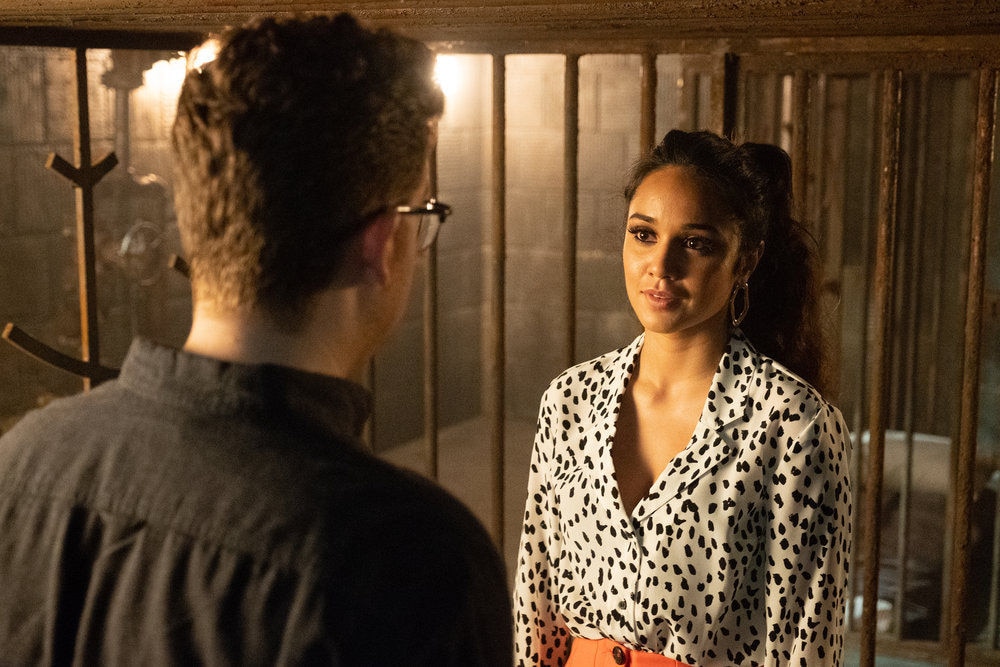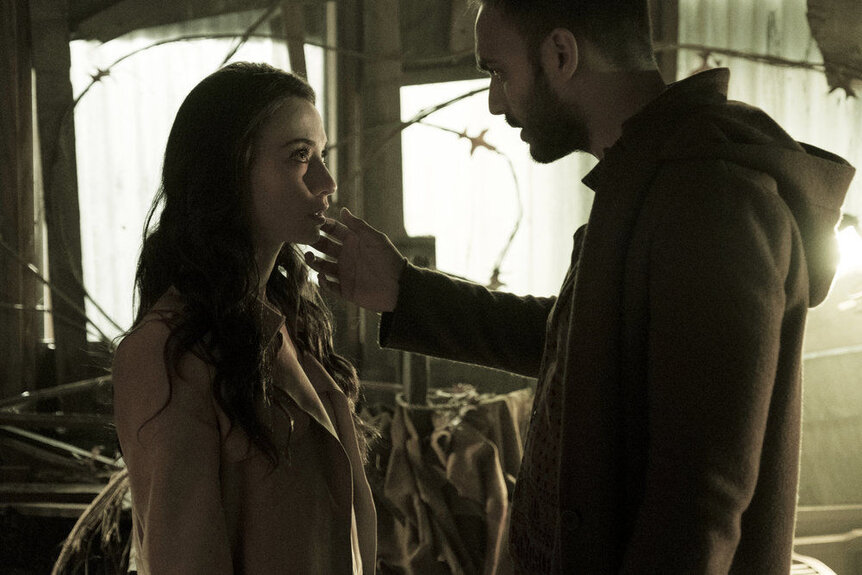Create a free profile to get unlimited access to exclusive videos, sweepstakes, and more!
The Magicians tackles consent in the #MeToo era better than any show on TV

If there’s one thing The Magicians has proven this season, it’s that’s chivalry really is dead… and that’s a good thing.
We’re only a handful of episodes into the sci-fi series' fourth run but already, we’ve been given a better view of what consent and accountability in this new #MeToo era looks like than any other series, genre or otherwise, has afforded us before. Of course, this is The Magicians, a show that specializes in sex-positive storylines — we’ve had orgies, traumatic sexual assaults and the healing that takes place after them, a slash coupling that’s fulfilled our fanfiction dreams — but even still, the show’s recent episode, “Marry, F*ck, Kill”, feels revolutionary.
That’s because the show tackles a concept that almost always floats on the edge of consciousness when discussing issues like #MeToo and sexual harassment, but rarely, if ever, is spoken aloud.
We’re talking about consent here, people.
In “Marry, F*ck, Kill,” two separate storylines confront that rarest of unicorns — the power of female bodily autonomy on TV.
In Fillory, we find Julia, a woman who has survived a violent sexual assault, been forced to confront her assailant, and abort the child that was a consequence of it. Julia is now a goddess, having used her harrowing experience to harness her power, heal, and help others do the same. She’s searching for answers as to her true nature and must rely on Penny (a friend and former lover in an alternate timeline) for help with an anointing ritual, one that requires her to strip naked and be worshipped with oil. It’s intimate and awkward for both but it’s made more so by Penny’s reluctance to go through with the act out of concern for Julia’s comfort.
Is it refreshing to see a man consider a woman’s needs above his own, particularly when it comes to a sexual interaction on TV? Sure, but that gallantry that Penny might’ve been applauded for in the past turns gratingly condescending when he continues to object to viewing and touching Julia’s naked body despite having her permission to do so. Julia is forced to argue with Penny over her the topic of her own free will in order to make him more comfortable with the situation. She has to assert herself, over and over again, explaining to her well-intentioned friend that she’s not, in fact, broken. She’s not a “flower” or a “delicate piece of glass” or any other fragile metaphor we chain to survivors of sexual assault. She’s a person and people heal.
Penny’s concern for her is heartwarming at best, but at worst, it’s just another hoop Julia must jump through in order to prove to others that she is capable of making decisions for herself.
You see, as “sweet” or “gentlemanly” as we would’ve described Penny’s actions before, with the benefit of hindsight and this new #MeToo-inspired era of awareness, his reluctance to listen to Julia only puts the burden of proof on her. Self-righteous chivalry is a subtler form of sexism. It implies that a man knows a woman’s needs better than she does. When Penny require constant affirmation of Julia’s consent, he’s not simply “looking out for her,” he’s devaluing her agency, he’s pushing her to relive her trauma in a way that makes him comfortable with their current situation, he’s requiring that she expend energy to make him feel safe and protected, not the other way around.
Listening, it turns out, is crucial to this idea of proactive consent, and it’s not just Julia’s storyline that proves it.Back in the “real world,” Margo and her friend Josh are also in a sexual pickle.
Josh unknowingly contracts a sort of Lycan STD, a werewolf disease transmitted through sex. He makes the responsible choice of visiting past lovers to inform them of the possibility they too may be infected. He shows care and consideration for his sexual partners and ample regret for not knowing about the chance of transmitting the infection sooner. (A pat on the back to Josh.)
Of course, things aren’t as simple as taking a stroll down his carnal memory land because poor Josh is still stuck with lycanthropy and the full moon is nigh. He must either find an uninfected sexual partner to transmit the disease to or kill someone to satisfy the bloodlust. Neither option sounds appealing to Josh who tries all sorts of rituals involving Kanye’s pet Komodo dragon and humping a maple tree to ward off his primal desires. Ultimately, Josh chooses to lock himself in a cage to prevent harming anyone, ensuring that when the moon rises, he’ll destroy himself instead.
Margo, as his friend, refuses to allow this. Josh may believe he’s making a “noble sacrifice,” something men seem to love doing on this show and others, but Margo sees his choice as an insult to her and the rest of the group who are already reeling from the supposed death of another friend, Eliot. So, Margo chooses to offer herself as payment, locking herself in the cage with Josh and consenting to intercourse with him in order to save her friend from a gruesome death.
Josh may see his decision to die as a magnanimous act of altruism, but Margo views her choice as a simple necessity, one she’s clearly not bothered by. But, yet again, a man needs proof of a woman’s agency. Josh puts up a fight when Margo suggests sex as an alternative to death which, besides forcing Margo to continuously assert herself, also has the added “ick” factor of equating consensual intercourse with a gory demise.
It’s another side of the sexist coin we rarely see on TV.
Our society has taught us that sex, for men, is, at best, a rite of passage, a normal, everyday occurrence. At worst, it’s proof of one’s masculinity. Men often discuss sex in aggressive ways, using language that suggests intercourse is conquering act, a testament to their manhood. By contrast, women’s relationship with sex has been subservient in so many ways. At best, it’s an “expression of love,” and a chance to “please” a man, preferably a husband, a form of commitment, an offering. At worst, it’s something that taints us, something stolen from us, a virginal sacrifice, a brownie point we reserve for when partners behave well. Sex is almost always described as something to be attained by men and withheld (for one reason or another) by women, which makes this idea of active consent so important.
TV constantly looks at the effects of not having consent — how many Law & Order episodes about date rapes and sexual assault have we been treated to over the years? We know how painful, how inhumane engaging in acts without a person’s consent, or worse, against their wishes, is. What’s less known, or maybe better put, less studied, is what it looks like when consent is given, and how that transaction should be handled.
When a person adamantly (and in a sober, coherent state of mind) asserts their independence, at what point do we stop questioning them? When a woman continuously assures her partner “she’s fine,” “she’s sure,” “she’s ready,” at what point does that affirmation gain credibility? Is there a line between “being respectful” and “being self-righteous”? Are we at a point in our culture where that line should be defined and openly talked about? Maybe those are questions we don’t have the answers to, but, at the same time, we’re glad a show like The Magicians is beginning to examine in a healthy, multifaceted way.
What we can learn from the show, and from this view of consent, is that actively listening to your partner is crucial to any interaction, sexual or otherwise. Respecting women, respecting their choices, their refusals and their affirmations is a good first step to drawing that line in the sand, to making consent a proactive ritual so that we’re not retroactively addressing the consequences of its absence. It's also a great way to redefine sex as a shared experience to be enjoyed by both parties, not some transactional obligation or performance in masculinity.
In the end, women don’t need men to look out for their best interests; they need them to shut up, listen, and take notes.















